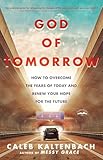When I was young and single, I moved to Southern California to work at a church. I didn’t know many people in the area, but eventually I became friends with a couple of guys from the church, and the three of us rented a house together. Having a bachelor pad was fun—late nights, tons of jokes, and inappropriate pranks galore.
God of Tomorrow: How to Overcome the Fears of Today and Renew Your Hope for the Future
Waterbrook
240 pages
$13.56
After a couple of years, one of my roommates got married and moved about 15 minutes away from our bachelor pad. I wasn’t surprised—he was the opposite of me in almost every way you could think: tall, good looking, lots of hair, in shape, tan, and he even worked for the Drug Enforcement Administration as an agent. Once he got married, eventually the other roommate and I went our separate ways.
About a year later, one evening near the end of October, I got one of those late-night phone calls that no one wants to receive. My roommate who had gotten married had been killed in a motorcycle accident. He had been riding his motorcycle down a residential street that evening when another driver made an illegal U-turn. My roommate’s motorcycle T-boned the car, throwing him from his bike and hurling him into eternity. It was horrific.
I arrived at the accident scene about 30 minutes after the call. Much of the site had been cleaned up already, but my friend’s bike was still in the middle of the street. It was absolutely destroyed. Friends who had gotten the same call started arriving. After a while, many of us went down the street to his house. His young widow was at home, understandably crying her eyes out. The setting of the house gave the false impression that he’d be right back. His drink was still on the counter, clothes were laid on the bed for tomorrow, the TV was on, and his book was in his chair. I half expected him to walk in the door, but I knew that wasn’t going to happen.
I sat in his house with 15 other people for about three hours. No one really said anything. There were lots of hugs and sobbing, but no conversations. Every person in that room was a follower of Jesus, so we prayed. We weren’t even sure what to pray, but we prayed.
A couple of weeks later, we had the memorial service and graveside observance. I still remember the graveside as if it were yesterday. I’ve attended many gravesides, but I’ve never seen as many people stay for the entire covering of the casket as did for my roommate’s. It was as if none of us wanted to leave, because if we left, we were submitting to the reality that he was gone from the earth.
Imagining the Last Day
Before I left the graveside, my eyes looked beyond the freeways of Hollywood and fixated on the hills behind Burbank. Clouds began forming behind the hills and started moving almost on top of them. I don’t know how clearly you can picture it, but it was a dramatic scene that touched my already emotional heart. I fervently asked Jesus to come back. But I knew there was a good chance that my timing wasn’t his.
I did, however, gain a perspective of hope that day. As I gazed at the hills, I was reminded that the power of God will be seen in supreme majesty when Jesus returns to bring justice, order, and redemption to this world. Closing my eyes, I remembered Paul’s description of Jesus’ return:
The trumpet will sound, the dead will be raised imperishable, and we will be changed. For the perishable must clothe itself with the imperishable, and the mortal with immortality. When the perishable has been clothed with the imperishable, and the mortal with immortality, then the saying that is written will come true: “Death has been swallowed up in victory.” (1 Cor. 15:52–54)
Imagining what it would be like on the last day when my roommate would be brought into his new God-given body provided hope. I still have that hope because I believe my God is powerful enough to bring Jesus back from the dead and will do the same for those who follow him. As much as I loathe death, I know that it won’t have the last laugh. God’s greatness deserves our trust and willingness to align our lives with his power. The hope he gives extends beyond the circumstances of society and the inconsistency of our lives. Only he has the power to give us such hope.
The Bible gives us a powerful promise that one day a greater tomorrow will arrive and we will all live in it. The power of God points us to a hope that is found in what he will do in the greatest tomorrow we can imagine! So whatever tomorrow delivers, whether it’s good news or tragedy, we will make it through because God holds tomorrow and will walk with us into tomorrow. He created and prepared tomorrow.
So often, though, it’s a challenge to believe this. We struggle to remain truly convinced that God is all powerful, has a plan for redemption, and is guiding us into a better tomorrow. When horrible things happen in our world, we’re far from certain that God can work them out for the good. Sometimes I have to stop and ask myself: If I believe God is sovereign and owns tomorrow, why doesn’t my life always reflect it?
To be sure, I understand that there are some who have clinical depression and other diagnosed disorders. But overall I believe that my worry can be a barometer of my faith and trust in God. I always wonder how my life would be different if I truly lived as if God already has my path planned. I’m sure there’s a good chance you’ve wondered the same thing about yourself.
In those moments when worry starts to rise and faith starts to fall, I must remind myself to go back and read about the power of God. Whether those are verses that describe God or stories in the Bible that build my trust in his power despite overwhelming odds, I’m comforted when I get done reading about his faithfulness.
Along with reading about God’s power, I have to be consistent in my daily prayer time. If I’m not spending time talking with God and listening for him, how in the world will I trust him? Similarly, I set aside some time to think about and remember all the times in the past when God has been faithful to me. He’s seen me through some pretty dark hours. When I can decrease the worry and increase my faith, it allows me to remember that God is in control and already has a plan for tomorrow. But the problem with worry is that it doesn’t only decrease my faith; it compromises the influence I can have in the lives of others. Having high faith and low worry takes my eyes off myself so I can do what God wants me to do: graciously offer hope to people today.
The Depth of Hope
With a God who has our back, we’ve got little to worry about. Paul assured us of the uselessness of worry when he wrote Philippians 4:6–7: “Do not be anxious about anything, but in every situation, by prayer and petition, with thanksgiving, present your requests to God. And the peace of God, which transcends all understanding, will guard your hearts and your minds in Christ Jesus.”
God has tomorrow under control because he’s the wisest and most capable being in existence. He is fully loving, gracious, and merciful, and he is personally involved in the lives of his followers. His unequaled power has important ramifications not only for our lives but also for our interactions with society.
We can boldly and graciously offer hope to people today because God has created and prepared tomorrow, and he will walk with us into it. Since God is supreme and has all power, we should refuse to grant fear the luxury of controlling our next steps.
We desperately need hope. When we talk about the word hope, we usually equate it to wishful thinking. We’ll say things such as, “We hope they accept our bid on the house we want” or “I hope I get the job I interviewed for.” In our culture, hope has become synonymous with wishing or aspiring. But that wasn’t always the case.
The word hope has more depth in the Bible. The authors of the Bible understood the word hope to be the expectancy of a promised outcome or the waiting period before a promise was carried out. Writers such as Paul also believed that hope originated from God and was assured by his supremacy and the strength of his integrity. That’s why Paul said in Romans 5:5 that hope doesn’t shame us. The hope that society longs for is found in God, who walks with us in life. The hope he offers will counter our fear and worry about the future. Our expectant hope is that God has the path laid out before us, will journey with us, and already knows what tomorrow holds.
Many people today are mired in worry and struggling to find sources of hope. We see disturbing trends in society that look irreversible, and we feel powerless to recover the values we’ve lost. But even here we can have hope, not because a future elected official or a boycott or a social crusade might reverse the situation, but because God is working out what is best in his time. He has promised the restoration of all things according to what is right, and he will do it.
With boldness and grace as our allies, let’s confidently point people in the direction of what hope has to offer: God himself. He himself is the focal point that we look to when we’re fatigued, upset, saddened, or troubled about the coming days. Hope reminds us that our best days are ahead, not behind us. Surrender tomorrow to God—he’s already been there.
Caleb Kaltenbach is a pastor in California and author of Messy Grace: How a Pastor with Gay Parents Learned to Love Others Without Sacrificing Conviction (WaterBrook). This article is adapted from his latest book, God of Tomorrow: How to Overcome the Fears of Today and Renew Your Hope for the Future (WaterBrook).
Copyright © 2018 by Caleb W. Kaltenbach. Published by WaterBrook, an imprint of Penguin Random House LLC.
Did this story resonate with you? Let us know here.











